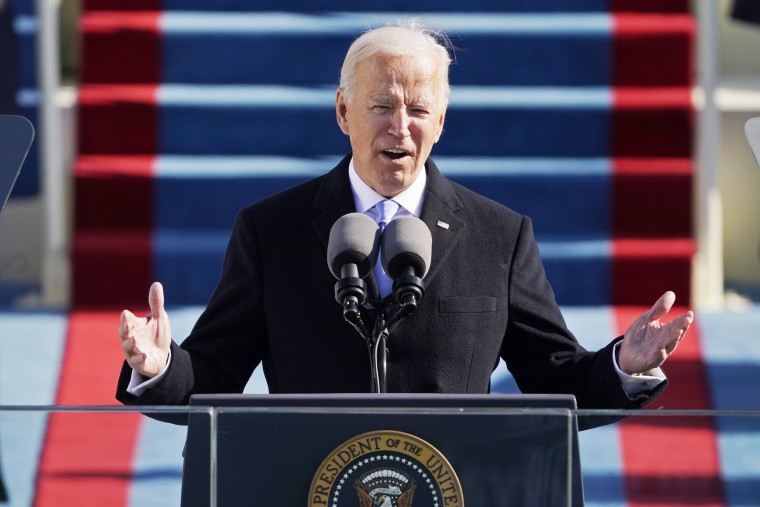It was a word that appeared in President Joe Biden's inaugural address eight times: "Unity."
"To overcome these challenges -- to restore the soul and to secure the future of America -- requires more than words. It requires that most elusive of things in a democracy: Unity.... With unity we can do great things.... For without unity, there is no peace, only bitterness and fury. No progress, only exhausting outrage. No nation, only a state of chaos. This is our historic moment of crisis and challenge, and unity is the path forward."
It wasn't long before a tiresome debate began over what the word actually means. Indeed, as the new president took a series of executive actions to advance his policy goals, and unveiled a series of proposals in line with his longstanding agenda, Republicans immediately cried foul -- not just because they disagreed with Biden's priorities, but also because they saw it as a betrayal of his "unity" pledge.
If the Democratic president were serious about unifying Americans, Republicans said, he'd put aside his own platform -- the one effectively endorsed by 81 million Americans in the recent election -- and instead start endorsing at least some of the GOP's ideas.
For Biden to govern in accordance with his beliefs, the argument goes, is to be divisive.
On the surface, there's a degree of irony to the whining. For the last four years, Republicans insisted they had a bold mandate to steamroll over everyone and everything in their path, even after Trump lost the popular vote, and even after Democrats earned a House majority in the 2018 midterms. The idea that Trump and his party had a responsibility to incorporate Democratic ideas into their governing vision -- to the extent that the post-policy, platform-less GOP has a governing vision -- was laughable.
But, Republicans respond, things are different now: Trump never even pretended to care about "unity," and Biden has made it an early central theme of his presidency. Ergo, there are new standards and expectations.
Perhaps, though definitions matter. In a healthy political system, "unity" is about the how, not the what.
By pledging to be a responsive, unifying leader, Biden has described a process and a governing style. He's committed to listening to Republicans, not to approving Republican demands. The new president said as much in his inaugural address:
"Let us listen to one another. Hear one another. See one another. Show respect to one another. Politics need not be a raging fire destroying everything in its path. Every disagreement doesn't have to be a cause for total war."
Biden doesn't intend to pit Americans against one another. He seems reluctant to engage in name-calling. He doesn't appear eager to decide who counts as a "real" American, or whose patriotism is worthy of his respect. He thinks those in "red" states have the same value and worth as those in "blue" states.
That's what "unity" means. It's about a process in which people are treated with mutual respect and decency. It's about recognizing the legitimacy of those who, in good faith, see the world differently. It's about believing in democracy and election results.
In all likelihood, the Republicans whining about Biden over the last 49 hours know this. They're playing a cynical little game, hoping to undermine the new presidency by suggesting it's incumbent on Biden to make them happy by curtailing his efforts to govern.
If GOP officials expect this to be persuasive, they're likely to be disappointed.

